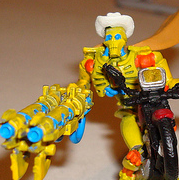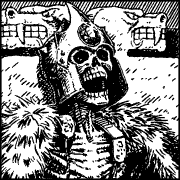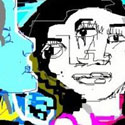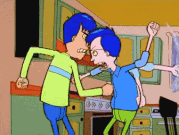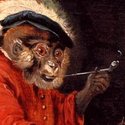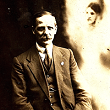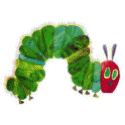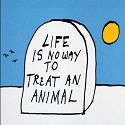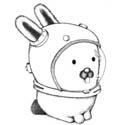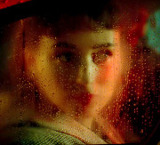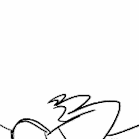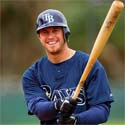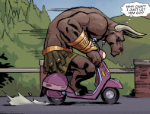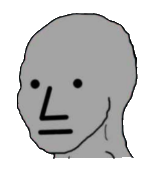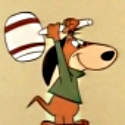|
It's that time again folks, where people get to feel superior to me because I read genre trash! 22) The Buried Pyramid by Jane Lindskold In my defense I didn't realize this was YA until I started reading it. It's long, but at least it's also boring. It's overly descriptive of even the most minute, trivial detail, the characters are flat, and the author somehow found a way to rob the setting of any of the excitement you'd expect. Even the "surprise, it is a fantasy book after all" twist 3/4 of the way through was dull. The trip through the Egyptian underworld was handled better in one of the officially published garbage Stargate fanfics that Fandemonium printed. 23) 1984 by George Orwell A rather chilling work. There's not really a lot more that I can say about it that hasn't already been said far better than I could ever put it. 24) Baldur's Gate by Philip Athans (didn't finish, counts as 1/2) Holy poo poo is this terrible, and not in the fun "let's make fun of how bad it is" way, but the "this is crap and I want an apology from the author" sort of way. Look, I don't expect much from a novelization of a video game, but this fails to meet even my low standards of an enjoyable read. The characterization is crap and the author fails to make good use of the material he was given to work with. 25) The Count of Monte Cristo by Alexandre Dumas I have two things to say about this book: It is, in my opinion, a fantastic work of fiction that everyone should read, and it is entirely too long. If you had asked me my opinion of the book before page 550 or so I would have said that it was a slog with far too many page wasting asides. (Did we really need Vampa's entire life story, or for the person telling that tale to stop in the middle of Vampa's life story to tell the tail of another, separate bandit chief?) The book started to pick up at around page 550, and the next 350 or so pages rapidly changed my opinion of the book as all of the Count's plans and plots started coming together. I read the 894 page Wordsworth Editions printing, based on the 1845 translation that apparently everyone except Penguin Books uses. That brings my running total to 24.5/120. I'm also upping my goal for the year to 120.
|
|
|
|

|
| # ? May 31, 2024 06:24 |
|
8one6 posted:25) The Count of Monte Cristo by Alexandre Dumas Someone warned me before I started reading it that the beginning was slow but to persevere and get through it because it gets really good later on, and maybe it was because I was expecting that, but I actually didn't have a problem with the early part of the book at all, I enjoyed it the whole way through.
|
|
|
|
Spadoink posted:January update list .. 9. Before They are Hanged - Joe Abercrombie 10. Now You're One of Us - Asa Nonami 11. Last Argument of Kings - Joe Abercrombie 12. The Widow Tree - Nicole Lundrigan 13. Nigh Film - Marish Pessl 14. Mr. Penumbra's 24-hour Bookstore - Robin Sloan 15. Half-Blood Blues - Esi Edugyan 16. The Lake - Banana Yoshimoto Finished out the First Law series (books #9 and 11) this month. The first book (The Blade Itself) I found almost painful to read to start, but there has been so many Abercrombie fans that I thought it might get better, and it did. Before They are Hanged and Last Argument of Kings are definitely stronger. It did cause me to reflect - I think fantasy series sometimes suffer because so much needs to be introduced in the first book - the characters, the world, the laws that govern the universe, etc etc that the first book of a series can be the weakest. I read the Hunger Games trilogy over a weekend in December and found the same thing, so it was already on my mind. Goodreads is turning out to be better than my local library at auto-suggesting things I might like, however, because I have read several Japanese authors at this point, it just keeps churning out more and more suggestions in that area, hence Asa Nonami and Banana Yoshimoto's inclusion on this list. I think I've read about a half dozen different Japanese (non-Haruki Murakami) books in the last three months or so, and I am seeing a very restrained, reserved style of writing and depiction. I can't remember exactly how the promotional blurb on The Lake went, but it was described as something along the lines of Banana Yoshimoto writing "quietly" and with a "light touch," which seems to be a bit of a trend. I found The Lake to be quite simple, but excellently executed. Now You're One of Us was interesting but not great, and is definitely an example of Japanese writer's "restraint" - I mean, this book was described as harking to Rosemary's Baby or Rebecca, but turns out to be about an incestuous orgy-having family who drug women and brain wash them into submission, which is quite lurid material, but presented in a really mundane way, up until the orgy and murder and pseudo-kidnapping which is still treated pretty lightly by western standards. Night Film was the first book in a long time to give me the creeps, in a really good, what the hell is going on, kind of way. The Widow Tree and Half-Blood Blues are both by female, Canadian authors for those of you looking to bulk up the xx chromosomes on your reading list. They were both excellent excellent excellent period pieces, and Half-Blood Blues was the Giller winner, for darn good reason. Half-Blood Blues flips between the 1937-1940 and 1992, focusing on Sid Griffiths, a blues bassist from the USA and his friends and bandmates as they move between Germany and France, with the Nazi regime penning them in. The Widow Tree takes place in Yugoslavia after the war, in the mid-50s or so, and is darkly moving, historically accurate and compelling, and just layered with compelling characters, moving narrative, revenge, betrayal, heart break and so on. Read both! And everybody should read Mr. Penumbra's 24-hour Bookstore. It is another genre-crossing book, and will probably appeal to fantasy, mystery, contemporary and lighter-fare readers. Occultism! Some kind of maybe magic? A book store! Googlers! Delicious!
|
|
|
|
Probably not going to finish anything else by the end of the month, so let's go for an update. 8) The Player of Games by Iain M. Banks I didn't realize board game fanfic could actually be good, let alone great. longer goodreads review 9) Grave Peril by Jim Butcher I'm rereading Dresden Files. I remember liking this book more. goodreads review 10) Wetbones by John Shirley This is the grossest book I've read. I loved it. goodreads review 11) Summer Knight by Jim Butcher This is where the series really kicks off. Great, if flawed, introduction to Butcher's "epic" side. goodreads review 12) The King In Yellow by Robert W. Chambers Too influential to really shock me, this was still a fantastic and bleak collection of antique horror. goodreads review 13) Sum: Forty Tales of the Afterlives by David Eagleman Speculative theology at its best. The closest a book has come to changing aspects of my life. goodreads review 13/60 Oh my god what a fuckin' white male month. Next month I'll do better, ugh. At least I'm reading a lot more short stories than before; I'm working through an anthology of Lightspeed Magazine's best, then hopefully I'll pick something a little less white male. Who am I kidding; March will probably be spy thrillers and whiskey swillers.
|
|
|
|
inktvis posted:1. Simon Leys - The Hall of Uselessness 11. Lee Ki-Ho - At Least We Can Apologize 12. Marcus Aurelius - Meditations 13. Renata Adler - Speedboat 14. Jacques Bonnet - Phantoms on the Bookshelves 15. Venturi, Brown & Izenour - Learning from Las Vegas 16. Hyun Ki Young - One Spoon on this Earth There was a special in late January sometime on all 10 books in Dalkey Archive's Library of Korean Literature, so why not? Figured I was starting off light with At Least We Can Apologise, a story of two clueless inmates of a shuttered asylum who are thrust into the real world and forced to find work. With zero marketable skills or understanding, they eventually hit on the idea of making a living from taking on other people's shame and apologising on their behalf. Turns out though that since the staff at the asylum violently abused them for years, they equate apologising with suffering horrific beatings, and have only a hazy idea of why people in the neighbourhood are traumatised by their new business. As comedy goes, it gets pretty dark; murders, multiple suicides, lives ruined. In fact one of the only things stopping it from sliding into shock for shock's sake is the ultra-banal narrative voice, which is pretty great in itself. The other one of the series I'd got through was One Spoon on this Earth, which is a loose childhood memoir built around a series of images. The author's village was burnt to the ground and its inhabitants massacred by government forces when he was young, so you'd assume he'd focus on it, but his real passion is bodily functions. poo poo, piss, cum, tears, vomit, blood, snot, animal viscera, farts, more piss - it's all there and dwelt on in loving detail. If you ever wanted to read a long meditation on strings of snot flapping in the wind, then this is your book. Translation seemed dodgy though, and the style comes across a little flat. Beyond Koreans' unresolved issues, I picked up the Meditations at an airport bookshop. Not hugely into it (in terms of readability, it's not a patch on Cicero or Lucretius). What you get is a long string of jottings that tend to cycle along the lines of "people all innately good/existence transient/stoic aphorism/on second thought, people actually a bunch of shits", but then again I was mostly reading it so I could get round to starting on Pierre Hadot's book on Aurelius, The Inner Citadel. Phantoms on the Bookshelves is a pretty slight little book by a bibliomaniac where he enthuses about the books that cover every inch of his apartment (bathroom included). Sure, these things tend to be pretty self-indulgent by nature, but I always pick them up when I see them - if someone with tens of thousands of books wants to talk about his favourite discoveries, who am I to argue? The Venturi is an architectural study of Las Vegas, or I guess at least how Vegas' pragmatic back-to-elementals approach could inform a new take on architecture which moves away from what the authors see as modernism's hollow holier-than-thou posturing towards an almost exaggerated emphasis on use. The (not entirely unwarranted) frothing over modernist excesses culminates later in the book in a brilliantly exasperated compromise between the monumental and the useful. Last but not least is Speedboat, which is easily the best of this month's lot. Its loose accumulation of observations and personal anecdotes defies description, but it's incredibly sharp, written with a hilarious detached irony, and quite possibly one of the most New York books ever written. So, to summarise, I did not have very much to do at work today.
|
|
|
|
ectoplasm fucked around with this message at 07:00 on Nov 8, 2014 |
|
|
|
Mr. Squishy posted:1 The Devils by Fyodor Dostoyevsky as translated by David Magarshack. 10 Those Barren Leaves by Aldous Huxley 11 The Private Memoirs and Confessions of a Justified Sinner by James Hogg 12 Virginibus Puerisque by Robert Louis Stevenson 13 Lady with a Lapdog and Other Stories by Anton Chekov as translated by David Magarshack 14 Crome Yellow by Aldous Huxley 15 Epitaph of a Small Winner by Machado de Assis as translated by William L. Grossman 16 My Life as a Fake by Peter Carey 17 The Middle Age of Mrs. Eliot by Angus Wilson 18 Ultramarine by Malcolm Lowry 19 German Short Stories as selected by Penguin Duel Text 20 The Hidden Persuaders by Vance Packard 21 Maigret and the Hundred Gibbets by Georges Simeon as translated by Tony White 22 In Cold Blood by Truman Capote ♀ 1/20 Σ 22/60 A lot of books but none of them by women. I've got Mill on the Floss on my desk but it's just not grabbed me, although I can see it's very good. I've reviewed some of these in another thread so I'll just give some notes on the rest Magarshack translates Chekov as well as he does Dostoyevsky. Lots of astutely observed stories, most verging on the tragic. My favourite of the bunch was A Boring Story, which reminded me a lot of The Tunnel Crome Yellow was the closest to a bad Huxley I've read. Possibly because I read it so hot on the heels of TBL. The segments detailing the imagined history of Crome were fantastic short stories, and a highlight in a rather paltry novel. Mrs. Eliot was the most enjoyable Wilson I've read, especially when it was about the titular character. She felt the freshest, the rest were familiar from his other books. I wonder if he ever met a European woman he liked, he always insults them pretty dreadfully. The review on the back of the book from the Telegraph is weirdly proud that a man should write a woman so well. Ultramarine is a lot like Melville's Redbarn but with the over-arching sense of order ripped out. This is the second Lowry I've read and I was just as baffled by Under the Volcano. An overeducated man likes a drink, and dislikes everything else. Very good but somehow leaves me a bit cold. The short stories were a bad buy: somehow I manage to overlook that they were duel-text for students of German. 80 pages of simple stories in simple language. Still, I bought it, read it, and I'm posting it here. I actually enjoyed Antigone and the Garden Dwarf by Gerd Gaiser. The Packard was a great trove of anecdotes (ever heard the one about the house wife, the cake mix, and the egg?), and the original of a couple of concerned essays I've read, but I actually found it a bit of a drag. So much of it is quoting ad pablum, and you can guess the ending of most stories before they began. He also reserves all judgement about the scientific legitimacy of this madness until the final chapter, where he raises a gentle eyebrow at it. It also gave a citation to a quotation I've heard a few times: "children are living breathing records of what we tell them every day" which was apparently said by Herb Sheldon. Finally I'd say it was good fun seeing someone refer to "the cancer scare" bedeviling the tobacco industry. The Maigret was the first Simeon I've read, I'd put him on the same pegging as le Carré. It was made all the sweeter as the book was something I'd just picked up as part of a cheap advertisement for a gallery opening. I should have read In Cold Blood before watching Capote which rather foregrounded the author's possibly questionable sympathy for one of his subjects. Not that it's possible to not notice the favouritism but it still coloured my reading. The first Capote I've read, awfully beautiful style. Mr. Squishy fucked around with this message at 18:54 on Feb 27, 2014 |
|
|
|
elbow posted:January - 10/52 February - 17/52 11. The Goldfinch, by Donna Tartt. I can't really say anything meaningful about this book. I really enjoyed it, though I found the chapters in Las Vegas absolutely excruciating, even more so than those in the hotel room in Amsterdam. I wish I could visit Hobie and his shop, they both sound magical. The last chapter, where he suddenly waxes lyrically for pages on end, felt disconnected from the rest of the book for me, and was really unnecessary. 4/5 12. Wuthering Heights, by Emily Bronte. I read this once when I was 17, and remember being swept up in the romance of it all. 11 years later and after having lived in Northern England for two years, I can only laugh at how romantic and naive I was then. It's still a great book, though. 4/5 13. Rose Under Fire, by Elizabeth Wein. This is the follow-up to Code Name Verity, so I had high hopes. Wein relied too much on the setting of the concentration camp for her emotional jabs and for the plot overall; I felt like this was a very lazily written novel. I also didn't care for the poetry at all - she's not a good poet. 3/5 14. Ready Player One, by Ernest Cline. A re-read for my book club; still love it. I can totally understand why some people hate this book, but it all works for me. 4/5 15. Pines, by Blake Crouch. Posted about this in the 'Just Finished' thread. 3/5 16. A Special Providence, by Richard Yates. This is my least favorite of Yates's novels, probably because I found it so difficult to understand the choices the two main characters made. Writing flawed characters is Yates's specialty, but I just couldn't relate to these two. On the other hand it was great to have him write about WWII; I wish he'd done more of it. 3.5/5 17. Winter's Bone, by Daniel Woodrell. This is a stark and striking look at life in the Ozarks. Woodrell is a fantastic writer, and I'm looking forward to reading more of his novels. 4/5
|
|
|
|
thespaceinvader posted:14: The Skinner by Neal Asher. I've been looking forward to this one. I must start it. 14: The Skinner - highly enjoyable. Not unpredictable, but straightforward, schlocky fun. Asher's constant teasing of Spatterjay and Hoopers pays off well. I feel he's by far at his best when working with (vaguely) human characters dealing with (vaguely) human problems in weird ecologies. Getting away from the AIs and galaxy-spanning stuff really helps. Plus, Hoopers are great. 15: Voyage of the Sable Keech. Spatterjay gets a bit bigger and more galaxy-spanning but remains human enough... for now... Pegged Spatterjay-infected Prador as being bad loving news early on, but as it turns out, for entirely the wrong reasons, so it kept me guessing a bit. 16: Orbus. A satisfying conclusion to an interesting series. I want more Spatterjay. I'll probably post a full review of this sequence when I've had some time to mull it over. 17: The Technician by Neal Asher. Again, Asher is at his best dealing with freaky ecologies (freacologies?), and Masada delivers, but again I find it tends to peter off a little when big AIs and giant galaxy-spanning threats get involved. It just gets a little too... unreal. Asher's a good writer, but I kind of feel he needs to stick to his oeuvre a bit more, and break away from aping Banks quite so much. 18: Currently reading Shadow of the Scorpion again by Asher. I think this will be my last Asher for a while, but I'm not sure what's next.
|
|
|
|
screenwritersblues posted:8) S. by JJ Abrams and Doug Dourst 9) The Flamethrowers by Rachel Kushner: At first, I didn't think that I was going to like it, mainly because of the fact the first chapter was boring as hell and not interesting. However, after that the book went full throttle and didn't stop until it broke the motorcycle landspeed record. I loved the fact that I knew that area that most of the novel was sent in NYC for once, mainly because that Little Italy is the area where I hang out whenever I'm in the city. 10) A Game of Thrones by GRRM: Yeah, while some of you many not have this problem as the title states, this year however, I got 99 books and GRRM is one. I wanted to say that I'm a fan of this series, but I'm not. I didn't like the fact that he jumped from character to character quite often or the fact that I had no clue which character was doing what or what family they belonged to. 11) Of Dice and Men: The Story of Dungeons and Dragons and the Men who Play It by David M. Ewalt: I really had higher hopes for this book. I was thinking that it was going to be a book about the history of D and D, which it was, but also had stories of celebrities who have played D and D. But it wasn't. It was a personal journey of a old school nerd. Kind of disappointing. 12) Goodbye to All That: Writers on Loving and Leaving New York Edited by Sarah Botton: I was very disappointed with this collection. I picked it up after all the praise that was give to it and was hoping it wasn't just female authors. However my fears where right. It was nothing but female authors. I guess that the editor didn't see any male authors that had the same experience that the female ones had. 13) Jim Henson: The Biography by Brian Jay Jones: This was the best biography that I read. It was perfect in every way. A little slow at first, mainly because there's a lot of background that's involved in his life, but once you get past that it's a great read. 13/30 Currently reading: Mo' Metta Blues: The World According to Questlove By Questlove. screenwritersblues fucked around with this message at 16:06 on Mar 2, 2014 |
|
|
|
screenwritersblues posted:12) Goodbye to All That: Writers on Loving and Leaving New York Edited by Sarah Botton: I was very disappointed with this novel. I picked it up after all the praise that was give to it and was hoping it wasn't just female authors. However my fears where right. It was nothing but female authors. screenwritersblues posted:I guess that the editor didn't see any male authors that had the same experience that the female ones had.
|
|
|
|
Hocus Pocus posted:1. Fame: A Novel in Nine Episodes by Daniel Kehlmann Well February was a bit slower because I started a new job, but I kept up momentum by reading shorter novels in the last two weeks. I also went through a couple of essay collections. 11. Bluebeard by Kurt Vonnegut In my top five Vonnegut novels - I enjoyed it more than the last two I read (Galapagos, Deadeye Dick). Rabo Karabekian was a rich character, and his struggles as a man and as an artist were sympathetic. Oh and the climactic reveal of his secret art piece is satisfying. 12. Mystery and Manners by Flannery O'Connor Many of the essays, by this acclaimed short story writer, were stitched together from speeches Flannery O'Connor had given at universities. This comes off with varying success: the essays on regional writing and the south work, but there is plenty of repetition. The essays on the idea of the 'Catholic novelist' are extremely repetitive, and dense. The opening piece is a gem though, about O'Connor's interest in raising peacocks. The books real value comes from her two essays on the aim of fiction and writing short stories. They make it worth the price of admission. 13. Rabbit, Run by John Updike At times fantastic prose, but there are some seriously OTT sentences going on. A young married man who goes by Rabbit (a high school nickname; he is painfully refusing to let go of his former glory as a star high school basketball player) bails on his family to take up with a prostitute. Rabbit is unpleasant company and I dragged my feet through the whole thing because I didn't care what he did next, and there wasn't any element of mystery. Not interested in reading the other books. 14. The Quiet American by Graham Greene I like when compact novels feel full. Set in Saigon during the first Indochina War, the book is narrated by Fowler a veteran British journalist. Fowler is having a relationship with a young Vietnamese woman, and a large part of the story is centered on his competition over her with a young, idealistic American aid worker named Pyle. It was great: nothing felt extraneous and Fowler's internal struggles and thought processes were visceral. 15. The Diary of a Madman, The Government Inspector and Selected Stories by Nikolay Gogol Like how 'Master and Man' was my introduction to Tolstoy, this was my introduction to Gogol. It had the same big impact. Not at all difficult, or slow, like I expected. The prose flowed and the stories often surprised me with where they ended up. Gogol has some big characters in supporting roles, but he also has range: he mixes surrealism with realism and has stories that mix the absurd, with poignancy and darkness. 'Nevsky Prospekt' is a good example of this. 16. The Sovereignty of Good by Iris Murdoch When I look up at night and see tiny distant suns, it makes me struggle to understand the desire to 'be remembered'. What does our species really matter? Or our planet? In the infinite span of time nobody is remembered. It’s a grounding idea, in many ways it is a leveller and equalizer – even if someone like Rupert Murdoch is motivated by the idea of legacy, it is an illusory motivation. All that's left is to carve out some small happiness for yourself, and to be kind; help everyone else along with their time on this rock. Finding the nightsky grounding is something Iris Murdoch echoes at one point (at least how I interpreted what she was saying). Nature and art are both means of supplanting the ego. Both make you look outside yourself and get a larger framing of existence. A fairly difficult book (I don't have much of an education in philosophy, and I haven't read much either), but definitely some ideas in there to mull over. 17. The Poems and Prose Poems of Charles Baudelaire by... Charles Baudelaire... I don't quite know how to read poetry, so any advice would be appreciated! I remember someone telling me years ago to read aloud and slowly, and after reading once, to look up any words I didn't know and then read the poem again. So that's how I went through this collection. I read slowly and let things wash over me and some lines struck some kind of chord, and some didn't. Overall I enjoyed it. Some of the short prose poems were strange, almost fable-like, and I was way into that. 18. Julius by Daphne du Maurier A difficult read, because Julius, like Rabbit, is not sympathetic. The book charts a young French Jew's life after the Prussian invasion of France in the 19th century and his rise to extraordinary wealth and power by the early 20th century. Julius is a sociopath. The problem this creates is he doesn't have much internal conflict. He doesn’t struggle with much you can relate to. His primary feeling towards other people is annoyance, and when he casts people aside, that's that. Loved ones die and once they’re gone you won’t see their name again. The book’s strength is how it creates a sense of place. The first act with a Paris under siege, and then Alger (a bustling melting pot of people and culture) is a highlight. 19. The 10% Solution by Ken Rand Recommended in one of Creative Convention’s resources threads. A solid, structured system for editing, doesn’t take much to learn and anyone writing fiction/essays could apply. Worth it. 20. The Ballad of Peckham Rye by Muriel Spark I bought this and some other books at a one of those antique warehouse markets? Where people rent out a little lot and then they can pack it full of whatever they want to sell. A lot of biscuit tins and bank calendars from 1974 that some hoarder reckons are valuable. I recognised the name Muriel Spark and the title was catchy, so I picked it up. A young, educated man enters a working class area in London and acts unusually and fucks with people. It never went far enough. Dougal Douglas is meant to be this manipulative trouble maker who is compared to a succubus and a devil, but I never got a sense of that. He just seemed to be this eccentric guy who seemed disinterested in other people, who would occasionally cause a scene. There was some lying and false empathy on his part, but it was more Manic Pixie Girl than Loki. No idea how he supposedly drove people to leave jobs, to kill, to want to kill, etc. I might reread it, I feel like I may have missed something. Fun characters and dialogue, I just didn’t buy what was going on. I'm starting The Pit and The Pendulum by Edgar Allan Poe. I am going to order some Kobo Abe and Alberto Moravia soon, if anyone has any suggestions that'd be great. Same goes for poetry. The challenge has been great so far! 20/72
|
|
|
|
ltr posted:1. The Fires of Heaven (Wheel of Time, #5) by Robert Jordan February update! 8. The Savage Boy by Nick Cole 9. The River is a Road by Nick Cole 10. The Lies of Locke Lamora (Gentleman Bastard, #1) by Scott Lynch 11. Ghost Story (The Dresden Files, #13) by Jim Butcher 11/52 completed The Savage Boy and The River is a Road were in the same book, but each were novel length so I counted them separately. They were good, not anything groundbreaking but expanded on the world and the story that began in The Old Man and the Wasteland. Whoever said that The Lies of Locke Lamora is like Oceans 11 in fantasy Venice was dead on. Fun book to read. I know there are a couple others in the series released and I'll get to them eventually. Ghost Story, ghosty story with Harry Dresden. It was a little hard to get into things as everything was turned on it's head in Changes, but some of the reveals at the end, helped redeem it.
|
|
|
|
Spadoink posted:
I'm disappointed to hear about Asa Nonami. That book has been on my to-read list for a while, the only thing preventing me from doing so is the lack of availability in e-book format (I'm almost entirely digital these days, mostly to save space in my already too crowded living space). Would you still recommend it as worth a read, or would you say that it's Takashi Miike lite? Glad that you enjoyed Night Film. There's a lot of haters out there but I really liked it and I would say it was one of my best reads of 2013. It's also one of those rare mystery books with a satisfying conclusion that really pulled together all the major themes of the novel.
|
|
|
|
Aphra Bane posted:January Books: Yay, February was much more productive! 4) Stargazing: Astronomy Without a Telescope by Patrick Moore. GR review 5) Great Australian Ghost Stories by Richard Davis GR review 6) Tamsin by Peter S Beagle GR review 7) The Rubaiyat of Omar Khayyam plus the Fitzgerald translation of Bird Parliament. GR review 8) The Breakwater House by Pascale Quiviger GR review 9) The Cosmic Serpent by Jeremy Narby GR "review" Tamsin was definitely my favourite of the lot. Not quite as good as The Last Unicorn, but still great.
|
|
|
|
January
Total: 7/52 Female authors: 3/20 Non-fiction: 2/10 Goodreads. I could blame having essays to write this month, but honestly I was just really lazy. Hardly accomplished anything all month. Nevermore had sort of a fairy-tale feel to it and some interesting ideas, but I never really felt invested in the story or cared about the characters. The biggest criticism I have though is that making it about Edgar Allan Poe seemed totally unnecessary; I really can't think how the story would change at all if the protagonist was someone else. You wouldn't get the link to The Raven, but that was tenuous at best anyway. I liked the first half of Hollow World but felt it fell down a bit after that. Firstly, there didn't seem to be enough time spent on describing Hollow World and it seemed like the portagonist really should have had a lot more questions, and even when he was being shown around and given tours, we the audience never really saw any of it. But the main problem was with the primary antagonist. I found the reveal really disappointing and it just didn't really get any better from there. Then there were a few little things (psychic humans and sentient trees amongst other things) that could have been overlooked if the core was good because they never have any real impact on the plot, but that was kind of part of the problem. Things were just thrown out there for no apparent reason.
|
|
|
|
Spadoink posted:And everybody should read Mr. Penumbra's 24-hour Bookstore. It is another genre-crossing book, and will probably appeal to fantasy, mystery, contemporary and lighter-fare readers. Occultism! Some kind of maybe magic? A book store! Googlers! Delicious! I need to try this one again. I thought it would be a break from the serious reading I was doing on Heian Japan but I only got as far as New York before putting it down and then forgetting about it until it was due back at the library. It was certainly interesting and I was just too wrapped up in my heavy reading to read anything else. (I liked the roommates, too!)
|
|
|
|
Poutling posted:I'm disappointed to hear about Asa Nonami. That book has been on my to-read list for a while, the only thing preventing me from doing so is the lack of availability in e-book format (I'm almost entirely digital these days, mostly to save space in my already too crowded living space). Would you still recommend it as worth a read, or would you say that it's Takashi Miike lite? Takashi Miike lite would probably still give a too-dark/heavy impression. I requested this book without knowing much about it, so I wasn't expecting anything in particular from it. I wasn't sure where it was going, but when the "dark twist" type stuff started being revealed it elicited more of a disappointed "really?" than a shocked reaction from me. It seemed like the author was artificially shoehorning what should be really shocking, darkly insidious plot matter into another "quiet" novel. I thought it might be a ghost-y story up to that point. I don't know. Its short, so it has that working for it if you are unsure about whether to read it or not. Night Film was an odd read, but really well executed. Except for the constant use of italics. If an author doesn't trust the reader to have a high enough reading skill to understand emphasis in regularly written words, then I begin to doubt the author's skill as a writer. Seriously, Pessl, stop using italics. If I was your editor I'd ban them from your work moving forward.
|
|
|
|
Prolonged Shame posted:1) Winters Heart - Robert Jordan Here are my February books: 1) Crossroads of Twilight - Robert Jordan: Oh man. Everyone kept saying that the series starts to drag around books 9-11 and they weren't kidding. Literally nothing of importance happens in this book. The plot doesn't advance at all. All the characters sit around squabbling with one another and Perrin goes to buy grain. 2) Divergent - Veronica Roth: I'm not usually too into young adult fiction but everyone has been raving about this series so I figured I'd read it before the movie came out. It's not bad. The premise is interesting but the characters are standard young adult types (fish out of water main character, attractive but with a mysterious past love interest, etc) 3) 1491: New Revelations of the Americas Before Columbus - Charles C. Mann: The author's hypothesis here it that the western hemisphere supported a much larger and more advanced pre-Columbus population that was decimated by smallpox and other European diseases leading to the notion that the new world was populated by only a small number of 'savages'. He makes a good case. I'm trying to read more non-fiction and found this quite enjoyable. 4) King Henry VI Part III - William Shakespeare: A satisfying end to the trilogy, even though I basically had to keep Wikipedia open while reading this to keep all the kings of England straight. 5) Grant - Jean Edward Smith: Loved this. Of the 20 presidential biographies I've read so far this is the only one I've given 5 stars. It read like a novel and did a fantastic job both relating the facts of Grant's life and giving the reader a real sense of his personality. I even understood most of the battle schematics and those are usually gibberish to me. 6) The Iliad - Homer: I've been meaning to read this forever. It was a little tedious and repetitive. I'm currently reading The Aeneid and enjoying it a lot more. 7) The Princess of Cleves - Madame de La Fayette: Some people consider this the first novel. It's a bit difficult keeping the characters straight but it's otherwise enjoyable. 8) Knife of Dreams - Robert Jordan: Thank goodness the plot started moving again, but the level of spanking has gone off the charts. Why are all these adults constantly spanking one another? It's bizarre and a little uncomfortable. Otherwise it was quite good. 9) Insurgent - Veronica Roth: I can't not finish a series. At least it was a quick read. Not terrible. 10) Rutherford B. Hayes - Hans L. Trefousse: Not an amazing biography, but he did a good job of showcasing Hays' personality. He's a pretty underrated president. Total: 19/100
|
|
|
|
Fellwenner posted:January! February! On track... 12/65 7) True Grit, by Charles Portis. Well, Rooster, I am shot to pieces! Classic western tale told in a narrative voice which could go poorly (that of a young adult), but is done well and works out perfectly. I watched both the old and new versions of the movie as well and I like the latter more; Hailee Steinfeld really nailed Mattie's tone. 8) The Emperor's Soul, by Brandon Sanderson. Brilliant, great atmosphere, great pacing. I wish Sanderson would stop contriving ways for his magic systems to be explained, though. 9) The Black Dahlia, by James Ellroy. This was great. Wonderful depiction of descent into obsession. 10) The Way of Kings, by Brandon Sanderson. Re-read. I think second time around I liked it better. The first time through I got kind of tired of all the flashbacks. 11) The Hunter, by Richard Stark. A basic revenge premise amongst criminals, elements of noir but with prose as blunt as the main character. If you enjoyed the movie Payback starring Mel Gibson then you'll enjoy this as they're basically the same story with some changes here and there. The book predates the movie by 37 years, though, and is the first of quite a few. 12) Possession, by Kat Richardson. Interesting and fun, better than the last book which was kind of slow.
|
|
|
|
I forgot to update in January so here is my combined January/February reading total... it is pitiful. January 1. Deathless by Catherynne M. Valente February 2. The Bread We Eat in Dreams by Catherynne M. Valente 3. Annihilation (Southern Reach Trilogy #1) by Jeff VanderMeer Started off the year with a Valente double feature; Deathless follows the life of a young woman in Soviet Russia during the '30s and '40s as she becomes involved with all sorts of figures in Russian folklore; The Bread We Eat in Dreams is a short story collection and all the ones it collects are very good (especially Silently and Very Fast) but I preferred her other collection from last year The Melancholy of Mechagirl. I usually take a long time to read Valente's work, I find her writing very filling, I know that's an odd word to describe it as but it's the best one I've thought of, I can only read so much before I just have to set it aside and digest it for awhile. Also read Annihilation which is the first in a trilogy of novellas to be released this year about a mysterious "Area X", it reminded me a lot of Stalker/Roadside Picnic in that it deals with a group of unnamed individuals exploring a vaguely defined, very threatening natural site; it was really good and I'm excited to read the next two installments. ... I'm really bad at describing things.
|
|
|
|
Walh Hara posted:
Update for February: 9. Harry Potter and the Order of the Phoenix ---- J. K. Rowling 10. Harry Potter and the Half-Blood Prince ---- J. K. Rowling 11. Dress Your Family in Curduroy and Denim ---- David Sedaris 12. The Way of Kings ---- Brandon Sanderson (reread) 13. Harry Potter and the Deathly Hallows ---- J. K. Rowling 14. Catch-22 ---- Joseph Heller I don't think I have to say anything about Harry Potter. Finally got around to read them, not sure why I waited so long since they read so fast anyway. Dress Your Family in Curduroy and Denim is the weakest of Sedaris' books I read so far, but still decent. For me, Let's Cure Diabetis with Owls > Me Talk Pretty One Day > Squirrel Seeks Chipmunk > Dress Your Family in Curduroy and Denim. The Way of Kings reread is to prepare myself for Words of Radiance. Catch-22 reread was because it was quite some time ago I read it last. Great book, but I had forgotten how extremely bleak and depressing the book becomes at moments.
|
|
|
|
Sadly I didn't have a chance to finish my short new book, so that'll have to wait for next month's update. February update: 2. John Irving - A Prayer For Owen Meany - I kind of loved this book. All about its characters, which are incredible. I actually picked up this book because it showed up on way too many favorite book lists on OKCupid profiles, and I thought I should read something that people loved so much. Now I see why they do. 3. Chimamanda Ngozi Adichie - Half of a Yellow Sun - Book club pick. A very good book I will probably never read again, because man is it depressing. A novel about the Nigerian civil war in the late 1960s, which, shamefully, I did not even know had happened. It's fiction, but only in the sense that these individual people are not real. This writeup is better than any I could offer. Terribly sad, especially when you consider that it is only nominally fiction. I am a bit sad about my own slow progress; every book I've read so far this year has been long, dense, or both. Hopefully it won't be a problem. My current read is quite short, but I suspect the next one will take me a while again (thanks book club!). As always, full reviews on my Goodreads: https://www.goodreads.com/user/show/5605419-rob
|
|
|
|
Here's my February update: 9. Havisham by Robert Frame- This is a backstory of Miss Havisham from Great Expectations. Although I hate Great Expectations, I have always been fascinated by the character, so I wanted to give this a shot. The author's style is very annoying to me. He uses a vignette style and it's often hard to decipher what is going on. 10. His Last Bow by Arthur Conan Doyle- love Sherlock Holmes stories, now I've read them all. 11. The Picture of Dorian Gray by Oscar Wilde- I love the language in this book. Wilde is one of those authors that I was forced to read in high school and never appreciated, but now that I'm older I appreciate it much more. I think I should re-read the Importance of Being Earnest. 12. One Hundred Years of Solitude by Gabriel Garcia Marquez- Some of the descriptions in this book are wonderful. I can't say I'm really a fan of magical realism, though. 13. The House of Spirits by Isabel Allende- Reading this back to back with One Hundred Years was kind of interesting because they share many similarities. I connected much more this story than I did the other one because although the main character is a horrible man, there are two well-written and strong female characters. 14. Unbroken:A World War II Story of Survival, Resilience, and Redemption by Lauren Hillenbrand- A historical account of a former Olympic athlete, world war ii veteran, and POW. I love this author (she also wrote Seabiscuit), This man is amazing. And, it's being made into a movie adapted by the Coen brothers and directed by Angelina Jolie. I hope it's good. I have finished my goal of reading 10 classics if I count all the Doyle books separately. I think I won't since most of them are novellas. If I don't count them, I'm already at 5.
|
|
|
|
Ika posted:I'll go for 40 this time. 5: Pawn of Prophecy 6: Queen of Sorcery 7: Magician's Gambit 8: Castle of Wizardry 9: Libriomancer 10: This case is gonna kill me 11: Dark Currents 12: Harvest of Time 13: The dirty streets of heaven (USER WAS PUT ON PROBATION FOR THIS POST)
|
|
|
|
February Overall: 14/70 Non-fiction: 3/20 Lifetime Reading List: 1/10 Female Authors: 2/12 Non-Europe/USA countries: 1/5 Gravity's Rainbow: 0/1 9. The Planets by Dava Sobel 10. The Lies of Locke Lamora by Scott Lynch 11. Machine of Death edited by Ryan North 12. Death with Interruptions by Jose Saramago 13. When Prophecy Fails: A Social and Psychological Study of a Modern Group That Predicted the Destruction of the World by Leon Festinger 14. Collapse: How Societies Choose to Fail or Succeed by Jared Diamond Caught up a bit on non-fic since I didn't get in any last month. I talked a little about The Planets earlier in the thread, so I won't go over that again. The Lies of Locke Lamora was pretty solid; I don't typically read a lot of fantasy and I probably won't continue with the series but it was more like a heist story in a fantasy setting. The setting itself seemed unique but unfortunately a lot of it seemed to be built as hooks for the later series so it didn't play a very prominent role in this first book. But luckily the author doesn't beat you over the head with sequel bait, so it still works as a self-contained story. Machine of Death was okay; it is a collection of short stories based on a central idea that the author of Dinosaur Comics or whatever came up with: a machine is invented that takes a drop of your blood and then perfectly predicts your death, but only as a sometimes vague short phrase. It is by all amateur authors and that shows because it was very hit, miss, and miss. A lot of the stories were obviously just set up around an inevitable twist, and while a few of those were fun they mostly just reminded me of watching The ABCs of Death where you spend the whole time trying to guess what the twist is. For some reason there were also way too many stories about the invention of the machine itself, which seems like the least interesting part of the concept. It was actually interesting to read Death with Interruptions immediately after Machine of Death. I wrote a little about it in another thread: quote:It was interesting, although I felt like the style (effectively stream of consciousness with characters speaking in line with no quotation marks are anything, and limited punctuation) was an excuse to jump into different ideas and narrative strings easily without completely resolving others. Which sort've worked since it is basically just a rumination on the nature of death. But at the same time I was just put off by the last bit of narrative which I felt was a bit hokey death falls in love with a dude and then turns into a real girl to be with him. Collapse and When Prophecy Fails were both excellent and informative. I can't offer a lot of insight into Collapse because I don't have the background to argue or expand upon its ideas, but it did offer some really interesting perspectives. I don't fully buy him tying in ancient societal collapse with modern problems because all of the societies he went over were low technology and isolated. Of course, he makes a point that technology won't necessarily save us but at the very least we have global communication and travel as well as scientists like him, so we have a few major legs up on Easter Islanders. Prophecy was good as well, although unfortunately the most interesting parts of the narrative (the drama between the people in this cult) were largely glossed over in favor of the larger scientific point. For instance, the most interesting part of the book is a segment in which a secondary member of the cult starts giving her own predictions and basically tries to wrest control of the group from the previous leader. This takes place over an entire night, but the author states up front that it's not really relevant to his thesis, and then only gives a handful of choice quotes.
|
|
|
|
Strong Mouse posted:1. Worm wildbow (J McCrae) So, sadly, I only read two books during February. Both of them were books I started around of October of last year, and I just stopped then, but I finished them! 10. Choosers of the Slain John Ringo - I really don't know why I read these. It's like a trainwreck, but... I don't know. The parts that didn't make me want to stop reading were quite enjoyable, but there were quite a few of the other parts. I started the next one, but I have no idea when I'll get around to finishing it. 11. Red Seas Under Red Skies Scott Lynch - I originally stopped this book almost exactly in the middle because I didn't want to see more of them captaining a ship after the person who was supposed to tell them what to do up and died, but from that point, the book became really good. This is a great series, and I really should read the next one. I have read 11 of my challenge of 75 books. My goodreads profile in case you want to see my reveiws of the books I have read. Some reviews are longer than what I have here, some are shorter. It really depends on the mood I am in when I write each thing respectively. I'm not sure why I didn't feel like reading too much last month. I thought about re-reading Way of Kings for the third time before I get Words of Radiance on Tuesday, but I just didn't feel it. Hopefully I'll catch up on some reading this month.
|
|
|
|
Lets see what I have done in February: 16. Strange Visitor From Another Century by Mark Waid and DC Comics: Legion of Super-Heroes Graphic Novel. I can't really keep up with comic book universes anymore, but this seemed okay. 17. Sting of the Zygons by Stephen Cole: Doctor Who novel, of the "adventure" type, with lots of running and plot twists. 18. Fortunately, the Milk by Neil Gaiman: I keep on reading whatever Neil Gaiman puts out, although he keeps on getting more twee and formulaic. The one good thing about this is that it is short. 19. What W.H. Auden Can do for You by Alexander McCall Smith: a review of Auden's poetry by a man known for writing mystery novels. I learned a few things about Auden from it. 20. Clear the Bridge by Richard H. O'Kane: A very detailed first person account of submarine war in the Pacific Theater of World War II. Recommended for students of World War II. 21. Roadside Picnic by The Brothers Strugatsky: A classic Russian science fiction novel, relatively unknown in the west. Recommended for people interested in science-fiction or Russia/the Soviet Union. 22. Cuckoo's Calling by J.K. Rowling (writing as Robert Galbraith): Classic private eye mystery novel, written under a pseudonym by Rowling. The phrase "page turner" and "I couldn't put it down" are overused, but I really did read this book for six hours straight, go to bed, wake up, and read for another two hours when I woke up. 23. Diary of a Wimpy Kid Book Eight by Jeff Kinney: The formula is getting a little worn at this point, but I still enjoyed this book. 24. Summertime by J.M. Coetzee: I read this book after a discussion about Coetzee in the Noble Prize thread. I say more about the book there. 25. The Journals of Sylvia Plath by Sylvia Plath: Interesting insight into an important 20th century literary figure. Mostly interesting to students of Plath, but also full of information on the 1950s in general. 26. The Vendor of Sweets by R.K. Narayan: Funny, insightful short novel about a businessman in India. Has multiple layers to enjoy. Especially recommended for people curious about Indian literature. 27. Endless Universes by Paul Steinhardt and Neil Turok: Book explaining the authors cosmological theories. I have a mixed reaction to popular books on physics. 28. Escape from Raven Castle by J.J. Fortune: I don't know how this got on my shelf, but it had been there for years so I decided to read it. YA adventure novel. Nothing spectacular. A good mixture of serious business and light reading.
|
|
|
|
Augster posted:JANUARY February 4. Journey to the West: Volume 2 5. Journey to the West: Volume 3 One more volume left but it'll have to wait til after (USER WAS PUT ON PROBATION FOR THIS POST)
|
|
|
|
February! 15. The Good Lord Bird - James McBride 16. Team of Rivals - Doris Kearns Goodwin 17. The Fellowship of the Ring - J.R.R. Tolkien 18. Gone Girl - Gillian Flynn 19. As I Lay Dying - William Faulkner 20. The Two Towers - J.R.R. Tolkien 21. The Flame Alphabet - Ben Marcus 22. Better Nate than Ever - Tim Federle 23. The Return of the King - J.R.R. Tolkien Favorites of the month: The Good Lord Bird was a great historical novel about abolitionist John Brown. It follows a boy (dressed as a girl for several years) who gets caught up in Brown's crew. It could be really funny, but everyone who knows Brown's story knows it doesn't have much of a happy ending. Team of Rivals was also excellent, a truly thorough biography of Lincoln and some of his cabinet members (Stanton, Bates, Seward, Chase, and others). Lincoln was a cool dude, he could tell a hell of a joke. I loved my reread of LOTR, as well. I've also started reading some children's/YA books for my work (we write curriculum for summer reading/writing classes for a tutoring company) and Better Nate than Ever was cute - the story of a kid sneaking to New York to audition for a Broadway play. Coming up next month: the Russian tome Life and Fate among others.
|
|
|
|
elbow posted:Ironically I think it's readers like you that are the reason that books like this need to exist. Your sole reason for not liking this book (not a novel, by the way) is that there are only female authors in it? Are you loving serious? I would normally not even bother defending myself, but come on. Don't get me wrong, it was a good collection, but it lacks diversity. It's good and all to hear what the other sex has to say about the topic, but I would have liked to hear what the male side had to say about the same experience. Most of the essays in the collection were somewhat interesting, but after a while it got kind of boring. It's almost like the editor was saying that male writers are more successful and don't have the same experience as female authors.
|
|
|
|
screenwritersblues posted:I would normally not even bother defending myself, but come on. Don't get me wrong, it was a good collection, but it lacks diversity. It's good and all to hear what the other sex has to say about the topic, but I would have liked to hear what the male side had to say about the same experience. Most of the essays in the collection were somewhat interesting, but after a while it got kind of boring. It's almost like the editor was saying that male writers are more successful and don't have the same experience as female authors. And yet the lack of diversity in The Best Film You've Never Seen didn't stop you from saying something about that book. I totally get being disappointed with a book because it's not what you were expecting (i.e. all female writers instead of a mix), but a) that is a lovely critique of a book and doesn't actually say anything about the contents itself, and b) it is not the book's fault that you didn't look at the ToC. Also, male writers don't have the same experiences as female writers.
|
|
|
|
thespaceinvader posted:18: Currently reading Shadow of the Scorpion again by Asher. I think this will be my last Asher for a while, but I'm not sure what's next. 18: Shadow of the Scorpion was great, not Asher's best, but still pretty decent, and nice to get a bit of historical background on Cormac. 19: Happy Hour In Hell by Tad Williams. The first Bobby Dollar book I very much enjoyed last year, so I'm looking forward to the second.
|
|
|
|
elbow posted:And yet the lack of diversity in The Best Film You've Never Seen didn't stop you from saying something about that book. I totally get being disappointed with a book because it's not what you were expecting (i.e. all female writers instead of a mix), but a) that is a lovely critique of a book and doesn't actually say anything about the contents itself, and b) it is not the book's fault that you didn't look at the ToC. I'm not going to let this turn into the comic book debate that show up in this thread for about three pages, but you're not making sense. I am no way shape or form critiquing any book that I read because A) I don't what to because it would turn into more of a nit picking fest for me and B) because they would be horrible. I'm doing more reactions than critiques. More saying what I thought about the book after I finished it. What you're doing and I'm doing with out books are two totally different things. All I said about The Best Film You've Never Seen was that I liked the book and with Goodbye to all That all I basically said was that I didn't like it and maybe what might have made it better. In reguards to you're whole ToC comment: Yes, I didn't read the entire thing and saw that it was all female writers. I gave it a shot anyway and after reading it decided that I didn't like it. If you have to nit-pick my reactions, then clearly there's something wrong that I'm doing.
|
|
|
|
Groke posted:1. Beyond the Rift by Peter Watts. Added to this: 6. The Long Earth by Terry Pratchett and Stephen Baxter 7. The Long War by same, sequel to the above. These were surely much more Baxter than Pratchett, but okay. The basic concept being that in the immediate future, it is discovered that there exists a huge number (at least millions) of alternate Earths, easily accessible to (most) humans (to the point where you can walk across the dimensions with a gizmo you can build yourself from components you buy at the local electronics shop), all broadly similar to our Earth but with no humans. This has various consequences. All in all an enjoyable read although the characters are mostly quite shallow and the plots haven't been all that surprising or anything -- the setting is interesting enough for now, at least. Baxter has his weaknesses and authorial tics and they're present here but I do keep reading his stuff and I'm sure I'll read the next one in this series as well. Just started on A Civil Campaign by Lois McMaster Bujold; more comfort rereading.
|
|
|
|
quote:
Correia is not a good writer but he is a fun one. The Grimnoir trilogy is basically alternate prohibition-era steampunk X-Men fanfic, and that's exactly what I was hoping for; sometimes you need to just shut your brain off for a while and watch the explosions. Warbreaker was excellent; I liked it a lot more than The Way of Kings. My biggest complaint is that it felt like it ended too quickly, with very little denoument after the climax. I kept picking up my reader and expecting it to still be showing Warbreaker. It's not quite right to say that it didn't feel finished, but it felt like it took my brain a while to catch up to the fact that it was over. Spadoink posted:And everybody should read Mr. Penumbra's 24-hour Bookstore. It is another genre-crossing book, and will probably appeal to fantasy, mystery, contemporary and lighter-fare readers. Occultism! Some kind of maybe magic? A book store! Googlers! Delicious! I liked Penumbra right up to the end, and then the ending was so bad that it retroactively erased all enjoyment I'd gotten up until then. The one-two punch of the incredibly stupid scene where they turn the full might of Google on the cipher followed by it turning out to be a simple Ceasar cipher that they should have been able to break in seconds just completely killed it for me.
|
|
|
|
ToxicFrog posted:I liked Penumbra right up to the end, and then the ending was so bad that it retroactively erased all enjoyment I'd gotten up until then. The one-two punch of the incredibly stupid scene where they turn the full might of Google on the cipher followed by it turning out to be a simple Ceasar cipher that they should have been able to break in seconds just completely killed it for me. Haha - I've given up on expecting satisfactory endings, so this didn't bother me. I saw the actual ending coming for a while in the book, and found the use of google as kind of hilarious. The Google environment is always held up as some kind of mythic of workplace (they get hammocks! and nap rooms! and other things that no one in a regular corporate office ever gets!), and I enjoyed the depiction of Google as some kind of free wheeling creative-play kindergarten. Heh. Of course Google would fail - if this was a teen drama, google would be the quarterback, with bright white teeth and a 4.0 gpa and a red sports car and a hot girlfriend. The obvious favourite never wins - the underdog, a person rather than a behemoth, had to crack the code.
|
|
|
|
Spadoink posted:Haha - I've given up on expecting satisfactory endings, so this didn't bother me. I saw the actual ending coming for a while in the book, and found the use of google as kind of hilarious. The Google environment is always held up as some kind of mythic of workplace (they get hammocks! and nap rooms! and other things that no one in a regular corporate office ever gets!), and I enjoyed the depiction of Google as some kind of free wheeling creative-play kindergarten. Heh. Of course Google would fail - if this was a teen drama, google would be the quarterback, with bright white teeth and a 4.0 gpa and a red sports car and a hot girlfriend. The obvious favourite never wins - the underdog, a person rather than a behemoth, had to crack the code. Oh, the bit that bothered me wasn't that it didn't work - I saw that coming a mile away. What bothered me was the fact that the entire scene was one very small step above a braindead-summer-action-flick "they're hacking all of our internets! ALL OF THEM!" scene in terms of technical acumen. I'm pretty sure Sloane can do better than that, based on the rest of the book. Having that and then the actual code being something that grade school kids break for fun, with no rational excuse given as to why no-one has broken it yet was just insulting.
|
|
|
|
Managed to squeeze in five more in February, although I read one of them three times... 5) Mother Night by Kurt Vonnegut 6) The Apprenticeship of Duddy Kravitz by Mordecai Richler 7) The Orenda by Joseph Boyden 8) Fight Club by Chuck Palahniuk 9) The Double Hook by Sheila Watson 9/30 Mother Night was the first Vonnegut I've gotten around to, and I greatly enjoyed it. He's always had a big reputation with a few of my friends, so I'm happy to say that this book lived up to the expectations set. I'll probably be grabbing at least one more of his books before the year is out. Richler wrote what is probably one of the most filmic novels I've ever read (shocking that they made a movie out of it...), about a Jewish kid from Montreal attempting to strike out from his past and make some money and a name for himself (based on his misreadings of his grandfather's Zionist beliefs). Super entertaining coming-of-age story, packed with its share of life lessons. The Orenda was probably built up a bit too much for me. It's in the running for this year's Canada Reads, and was hailed as simply one of the best Canadian novels when it came out last year. I appreciate it for what it is (a tome about the establishment of Canada with more than a few allegories about the modern state of First Nations relations in the country, handled with a surprising amount of subtlety), but something about it just kind of fell flat for me. I think the characters, mostly. But oh well. I definitely now understand Boyden's talent and reputation, and might have to pick up Three Day Road sometime soon. I, unfortunately, went into Fight Club with full knowledge of the movie. I know THE TWIST isn't all there is to this novel, but I would have liked to have read it blind for the first time. I also study a lot of anti-capitalist material in school, so I feel like its criticism were somewhat lacking, but I know it's not an academic text so I can't really judge it on that. But something about the behaviour of the narrator felt kind of childish (setting off car alarms, peeing in soup as a means of criticizing the problems of late capitalism... hmm), and kind of took me out of the story. It had a very interesting style, however, but I don't feel drawn to read more Palahniuk any time soon. The Double Hook was the one I read three times. It is quite the book. An unassuming slight of a thing on the outside, it contains a depth of text that I haven't really experienced before. It's a highly allusive (making reference to the Bible, Arthurian legend, among other sources throughout), sparsely written novel about a community in British Columbia's interior that is disintegrating quite rapidly. Lessons on morality, the need for art and culture in maintaining a community, and the value of bonds abound. I don't really know what to say about it, it's just quite mesmerizing. It's unfortunate that Watson didn't have a hugely prolific career, but I'll definitely be devouring what I can of hers. Well that was a lot of words. Hopefully March will bring some great reads as well.
|
|
|
|

|
| # ? May 31, 2024 06:24 |
|
Dead Man Saloon posted:
Fight Club, the book, was written 18 years ago, and the movie was released 15 years ago. I think I read it in 2001 or so. Even at the time, it didn't seem that innovative to me. As both a work of literature and a sociopolitical tract, the idea that we should all just reclaim our individuality against a conformist world seems a bit trite. I didn't think it was bad, it is just that the idea of "rebel against the system" isn't exactly that original.
|
|
|


